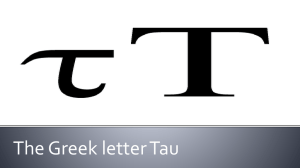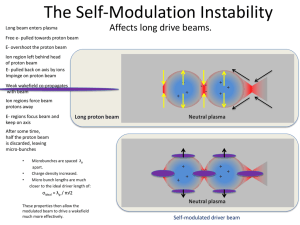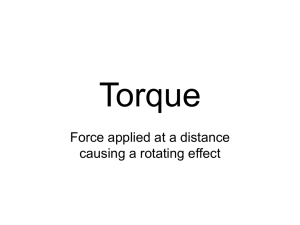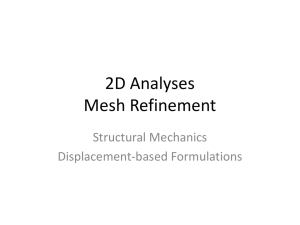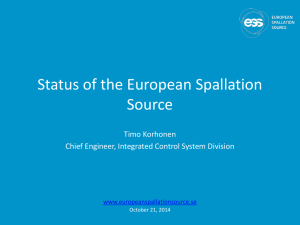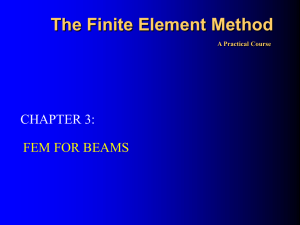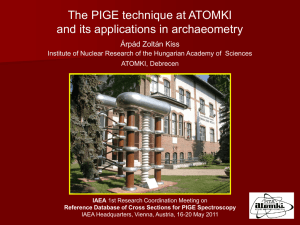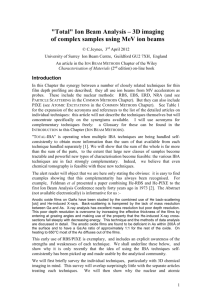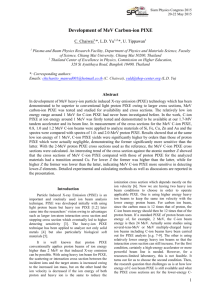F. Lucarelli
advertisement
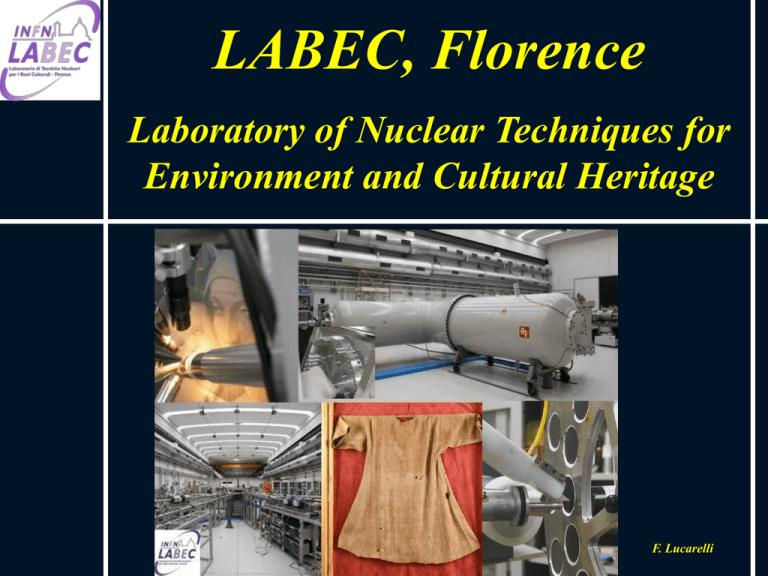
LABEC, Florence Laboratory of Nuclear Techniques for Environment and Cultural Heritage F. Lucarelli In Florence.... • Long-time tradition with PIXE (and IBA in general) applied to Cultural Heritage This activity started in the middle of the Eighties with an old Van de Graaff single-ended accelerator... Until mid 1980’s a local activity of nuclear physics with the 3 MV van de Graaff accelerator From mid 1980’s its “research goals” were changed to applications, mainly Ion Beam Analysis, IBA (mostly Particle-Induced X ray Emission, PIXE) Ion Beam Analysis (IBA) • Material composition analysis through beam particle bombardment typically proton or alpha beams at some MeV energy radiation detection and spectral analysis 2500 Si Conteggi 2000 1500 Ca 1000 Al Mg 500 Fe 0 0 1000 2000 3000 4000 5000 6000 7000 8000 EX (eV) emission of radiation of characteristic energies (X-rays, g-rays, particles…) particle beam particle accelerator 3 2002-2003 move of the Physics Department to the new campus in Sesto Fiorentino • INFN and University create a new lab • new 3 MV Tandetron, designed from the beginning to perform both IBA and Accelerator Mass Spectrometry (AMS) • The new laboratory, LABEC, is operational in May 2004 Copyright foto Luca Casonato, 2009 Tandetron, 3 MV max. terminal voltage 3 independent ion sources (single-cahode Cs sputter, 59-cathode Cs sputter, Duoplasmatron) 6 beamlines for Ion Beam Analysis (IBA) 1 beamline for Accelerator Mass Spectrometry (AMS) Accelerator hall The Tandetron facility at LABEC 3 MV Tandetron IBA dual source external beam (Environment) external micro-beam multi-sample AMS source high-energy AMS spectrometer external beam (Cultural Heritage) multipurpose IBA vacuum chamber chopped beam line multi-angle scattering chamber Activities at LABEC technological developments (electronics and process automation, data acquisition systems, detection setups, further beamlines) methodological developments (test of new ideas for application procedures) measurements in the framework of both: interdisciplinary research projects in collaboration with other Institutions (CNR, Cultural Heritage safeguard Institutions, Environmental Protection Agencies) and University Departments other than Physics Dpts “internal” collaborations supporting other nuclear physics groups (detector tests, radiation damage measurements, etc.) Beam time 25-30% AMS 30% IBA aerosol 30-35% IBA for Cultural Heritage and other applications 10% neither AMS nor IBA AMS at LABEC The low-energy and high-energy AMS lines are equipped with the necessary hardware to implement the measurement of 14C, 10Be, 26Al and 129I. at LABEC AMS 14C, 14C in turn, mainly for archaeological dating Standard precision < 0.5% (< 0.3% when required) Overall background: ~ 50000 y equivalent AMS 14C dating at LABEC about 300 samples analysed per year (home-prepared) + 100 prepared outside Distribution of analysed materials Relics of St. Francis (tunics and other) kept in the church of St.Francis in Cortona and in the Basilica of Santa Croce (Florence) Etruscan site diggings in Southern Tuscany River sediments – the Abak Creek layers in Ethiopia Archaeological diggings in downtown Florence (Palazzo Vecchio and surroundings) Scientific American online NEWS @ Nature.com 6 settembre 2007 5 settembre 2007 The Artemidor’s papyrus The icon in the Basilica of Santa Maria in Aracoeli, Rome The Rosano Crucifix Atmospheric aerosols Solid or liquid particles with a diameter from 10-3 to 102 μm • natural or anthropogenic sources • primary or secondary origin Impact on the environment Impact on human health Impact on cultural heritage What do we need to study aerosols Many good data concerning: • PM concentration and composition • size distribution • optical properties • time and space evolution Quantification and identification of PM emissions sources through receptor models OUTPUT Contribution to pollution abatement policies to improve air qualitity Contribution to climate models to assess the role of atmospheric aerosols in radiative forcing PIXE-PIGE external set-up at LABEC for aerosol composition measurements He Gamma ray det. HPGe Faraday cup Light elements X ray detector (SDD) Higher-Z elements X ray detector (Si(Li)) LABEC aerosol group research projects Local impact: • Study of PM10, PM2.5 and PM1 in Tuscany (PATOS, PATOS 2) and in major Italian towns, Barcelona, Sevilla, Elche, Alicante, London, Japan Global impact: • EPICA - European Project for Ice Coring in Antarctica • TALDICE - TALos Dome Ice CorE • ANDRILL - Antarctic Geological Drilling • AMMA - African Monsoon Multidisciplinary Analysis • MAIL - Marine Aerosol in the Island of Lampedusa • DIRIGIBILE ITALIA (multidisciplinary study of climate change in Arctic region) Environmental monitoring at cultural heritage sites Indoor pollution/Personal exposure: • HEARTS - Health Effects And Risks of Transport Systems biomass burning 23% 03/10/06 03/10/06 19/09/06 19/09/06 05/09/06 05/09/06 soil dust 18% 22/08/06 22/08/06 80 08/08/06 08/08/06 100 25/07/06 25/07/06 120 11/07/06 11/07/06 PM10 27/06/06 27/06/06 13/06/06 13/06/06 30/05/06 16/05/06 Average source apportionment 02/05/06 18/04/06 04/04/06 21/03/06 07/03/06 21/02/06 07/02/06 24/01/06 10/01/06 27/12/05 13/12/05 29/11/05 15/11/05 01/11/05 18/10/05 04/10/05 20/09/05 06/09/05 3 concentration (mg/m ) marine aerosol 5% secondary sulphate 17% secondary nitrate 12% traffic 25% 140 marine aerosol biomass burning traffic secondary nitrate secondary sulphate soil dust 60 40 20 0 Remote areas Antarctic dust dust particles deposited over the Antarctic ice sheet and archived in ice core samples (spanning the last 220 kyr), to investigate global climate changes Desert aerosol collected during the AMMA project (African Monsoon Multidisciplinary Analyses) AMS 14C measurements in aerosols 14C fraction with respect to modern carbon: ~ 0 in the aerosols produced by fossil fuels ~ 1 in the aerosol of biogenic origin or from biomass burning Marker of pollution from fossil fuels burning S. Szidat, Science 323 (2009), 470 Ion Beam Analysis techniques for Cultural Heritage LABEC – Laboratorio di Tecniche Nucleari per l’Ambiente e i Beni Culturali Using external beam set-ups we can investigate in a totally non-destructive way the complete quantitative composition of any kind of artwork Analysis of ancient glass, External PIXE-PIGE analysis of the glass tesserae from Villa Adriana ...glazed terracottas, External PIXE analysis of the “Ritratto di fanciullo” by Luca Della Robbia – before restoration at the Opificio delle Pietre Dure in Florence ...ancient illuminated manuscripts, External-beam PIXE analysis of the frontispiece of Pl.16,22 (XV century, Biblioteca Laurenziana in Florence) ...historical documents, Inks in Galileo’s manuscripts (Florence National Library) analysed by external PIXE …ancient embroideries, …early photographs, Micro-PIXE and –PIGE analysis of gold threads of a Renaissance embroidery based on a cartoon by Raffaellino del Garbo PIXE-PIGE analysis of a print on metal plate of the XIX century ...drawings, PIXE-PIGE analysis of a drawing on prepared paper, by Leonardo or his school PIXE-PIGE analysis of a drawing on prepared paper, school of Verona, XVI cent. ...paintings on wood or canvas Differential PIXE and PIGE analysis of the Micro-PIXE and -PIGE analysis of the Madonna dei Fusi by Leonardo “Ritratto Trivulzio” by Antonello da Messina Giorgio Vasari Tavoletta with S.Lucia, from Pala Albergotti, Arezzo Andrea Mantegna Madonna col Bambino, oil on canvas, Accademia Carrara di Bergamo …manufacts in semi-precious stones, “Disc with star” from the “Collezione Medicea di Pietre Ornamentali” of the Natural History Museum in Florence ( mineralogy and lithology division) Two dedicated external beamlines beam size defined by collimation (Ø 0.2 ÷ 1 mm) strong focusing system, quadrupole doublet (Ø 8÷10 mm) External microbeam line < 10 mm beam size on target magnetic scan of areas within the window aperture list-mode (E,x,y) DAQ includes detection systems for PIXE, PIGE, backward and forward particle scattering, ion induced luminescence (IBIL) beam Elemental mapping The eye of the Virgin 2 mm Au Lα Pb Lα Sn K Fe 2 mm The veil Au Lα Si Al Pb Lα External microbeam line full control of beam currents from a few nA down to ultra low (hundreds of particles/sec) higher beam intensities elemental PIXE –PIGE maps also for trace elements (of great interest e.g. for geologists) ultra-low currents possibility of scanning transmission ion microscopy (STIM) tests of detectors response as a function of position (through IBICC, ion beam induced charge collection) Another achievement, exploiting IBMM (Ion Beam Modification of Materials) Ion lithography (with protons or even heavier ions) through beam-induced alteration of material properties (optical, electrical, etc.) on selected zones “drawn” by the microbeam scan (material properties are selectively altered in depth thanks to the Bragg peak) Electrostatic deflector beamline (pulsed beam facility) Beam bunches with different particle multiplicity can be delivered directly to a detector for response tests to particles 1000 3 MeV protons 800 600 400 200 0 1600 5 MeV protons 1400 1200 1000 800 600 400 200 0 20 40 60 80 MeV 100 120 140 Not only accelerator-based techniques at LABEC Design, construction and applications of an innovative transportable XRF system with superior performance, in particular for low-Z elements detection The transportable XRF spectrometer ● independent PS for the two tubes ● data acquisition, He flow, X-Y-Z displacement and video camera are remotely controlled (via Ethernet) by the same computer Controller Measurement head ● 2 X ray tubes (30 kV max, 1 mA max) with two different anodes (typically Mo e Ti; W if needed) ● interchangeable collimators; typical beam diameter 0.5 mm ● SDD detector (active area 10 mm2, 450 μm thickness, FWHM 139 eV @ 5.9 keV) ● helium flow in front of both tubes and detector ● 2 laser beams for accurate positioning ● telecamera Ultramarine blue layer on chalk XRF spectrum with our spectrometre Stesura oltremare ultramarine blueartificiale layer 6000 Si 5000 conteggi 4000 3000 Al S (+Mo) 2000 Ca 1000 Na K Ca Fe 0 0 1000 2000 3000 4000 5000 energia (eV) Mo 22kV 6000 7000 8000 9000 10000 Head of a Prophet” by Lorenzo Ghiberti (part of the Paradise Gate of the Florence Baptistery) Gilded bronze “ Affresco della Resurrezione Piero della Francesca Sansepolcro, Museo Civico Crocefisso, Maestro di Figline Santa Croce Globi del Coronelli Museo Galileo Santa Croce, Cappella Bardi – ciclo di affreschi di Giotto Madonna del Granduca Raffaello Galleria Palatina Thank you for your attention! LABEC – chi ci lavora Luca Cararresi Massimo Chiari Lorenzo Giuntini (tec) Franco Lucarelli Pier Andrea Mandò Marco Manetti (tec.) Silvia Nava Francesco Taccetti (tec.) Silvia Calusi (post doc) Giulia Calzolai (post doc) Mariaelena Fedi (ricerc. tempo det.) Lucia Caforio (phd st.) yellow INFN white UniFi S.Francesco Church at Cortona It was build by Padre Elia a few years after the death of St- Francesco (1226). Three important relics are kept there : A pillow, on which tradition tells St. Francis was leaning his head while passing away The frok; according to tradition, the one used to cover the Saint’s body at the moment of his death. un evangeliario Atmospheric data from Reimer et al (2004);OxCal v3.10 Bronk Ramsey (2005); cub r:5 sd:12 prob usp[chron] tonaca Cortona 857±18BP cuscino 1 915±40BP cuscino 3 885±30BP Tonaca S.Croce 666±18BP cingolo S.Croce 852±34BP 600CalAD 800CalAD 1000CalAD 1200CalAD Calibrated date 1400CalAD 1600CalAD Continuous streaker sampler 1 Hour Montelupo Fiorentino: artistic glass industry Traffic emissions No chemical analysis is possible! mg/m3 emissions from industries 5 4 3 2 1 0 As Na K 3.00 15.00 3.00 15.00 3.00 15.00 3.00 15.00 3.00 15.00 3.00 15.00 3.00 15.00 Identification of fugitive Ice-dust and PSA-sediments composition TiO2 1% MnO 0% Fe2O3 8% Na2O 2% MgO 2% CaO 1% ghiaccio Composizione media del mineral dust durante le ultime ere glaciali CaO 2% SiO2 60% Al2O3 22% SiO2 52% sud America Al2O3 20% K2O 3% MgO 5% K2O 3% Fe2O3 Na O 2 10% 1% MgO 3% Na2O 0% TiO2 1% SiO2 68% MnO TiO2% 0% 1% Fe2O3 16% CaO 1% Al2O3 15% K2O 3% MnO 0% Confronto con composizione sedimenti nelle possibili zone sorgenti per studiare i fenomeni di trasporto Fe2O3 MnO 17% 0% Na2O 1% MgO 5% TiO2 1% CaO 1% Al2O3 27% K2O 4% SiO2 44% External STIM set-up STIM of a thin copper grid map of higher-energy transmitted protons map of lower-energy transmitted protons

